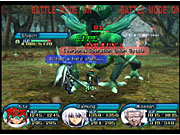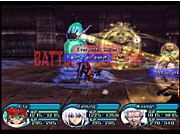Sometimes a once-promising video game series starts going downhill. The gameplay, concept, characters, graphics, and sound begin failing to impress as they once did. Bandai's .hack (pronounced "dot hack") series isn't anything unusual in this regard--though since its installments are being released just three months apart, it's technically going downhill faster than is normal. Earlier this year, Bandai released the first episode of this straightforward action RPG series, which earned a lot of attention because of its original premise, because of its anime tie-in, and also because the series would span across four separate episodes released in close proximity. Indeed, the company quickly released the second installment, but seeing as that game did nothing to resolve any of its predecessor's numerous shortcomings, evidently the series wasn't aiming as high as its lofty concept might have suggested. The new third installment, dubbed Outbreak, stands as further proof that this series really isn't worth the typical role-playing game fan's time or money. Though it divulges a few more bits of storyline, Outbreak's gameplay is simple and repetitive to the extreme and is even worse off for being just like Mutation before it, which in turn was just like the first episode, Infection, which was marginally good to begin with.

Those who played through the previous two games in the series are in store for exactly the same thing once again in Outbreak. The game continues the adventures of Kite, a player character in a massively multiplayer online RPG called The World, who is trying to discover why some players of The World are mysteriously falling comatose--and why The World appears to be getting more and more corrupted. This time you'll be fighting higher-level monsters, ranging from levels 50 through 70, but you'll be in this same range yourself, so there's relatively little difference--you have more hit points, but enemies deal more damage, but your healing spells are more potent. The gameplay still revolves almost exclusively around warping into randomly generated fields, then heading to the entrances of randomly generated dungeons, then battling your way through to the bottom of those dungeons--over and over and over.
The new game offers almost nothing new in terms of graphics, sound, or anything, and even though the dungeons are randomized, by now you'll have slogged through so many dozens of them that there will be absolutely no surprises in store here. The combat, meanwhile, is as awkwardly paced as ever, since the real-time action must constantly be paused so that you can use items, issue basic orders to your party members, and so forth. There's little real strategy or depth to be found, though the combat is tougher this time than in previous episodes, thanks to the predominance of enemies that are either impervious to magic or to physical attacks. Outbreak, like its predecessors, is short by RPG standards--it will take you around 20 hours to play through it--but the action is so incredibly repetitive from the get-go that the game still feels much too long.
Outbreak doesn't have any noteworthy new features, but it does have one noteworthy new shortcoming. Like the previous game, this one lets you import your saved data so that you can start with the same items and experience levels you had at the conclusion of Mutation. However, the very first challenge you're presented with in the game is a solo dungeon crawl that your character may be ill equipped to deal with unless you kept leveling up after you finished Mutation. For whatever reason, none of your party members will join up with you until you pass this dungeon, which means you'll have an inordinately difficult time even trying to level up all by yourself if you're not well equipped to handle the dungeon. So not only is the game repetitive right from the start, but it can be very frustrating at first, too. For what it's worth, once you get past this first hurdle, the going gets easier.

Only a couple of new characters will join you on your quest this time around, though most all the game's characters are so one-dimensional and so similar in battle that this hardly seems to matter. Likewise, there's just one new town (in which you can raise a couple more types of those piglike grunties), but since all the towns in the game are devoid of anything but the same rudimentary shops and services, there just as well could have been no new town at all. At least Outbreak is somewhat less miserly with the cutscenes and story sequences than Mutation. You do finally start to get a sense of how the series is going to wrap up. Still, the dialogue is as inane as ever. Characters speak in non sequiturs--a poor translation from the original Japanese seems at least partly responsible--and their exchanges will leave you scratching your head more often than not. Some of the character designs of this series may seem appealing, thanks to the concept work by Evangelion's Yoshiyuki Sadamoto, but don't expect any meaningful character development to take place during the course of this game. Do expect, however, more of those pointless e-mail exchanges between the main character and his friends.
Like its predecessors, Outbreak is a full-priced product, though it comes bundled with an anime DVD that at this point may well be more enticing than the actual game. At any rate, Outbreak just doesn't make for a satisfying experience--not unless, for some reason, you love the previous games and you're comfortable spending still more time and more money on a game you've already played through twice, just to see a few more cutscenes. In the end, Outbreak gives more weight to the argument that .hack probably should have been one $50, 30-hour game instead of four $50, 20-hour games. Of course, a fourth and final installment yet remains, but in the wake of this third game, one would have due cause to be skeptical about it.



